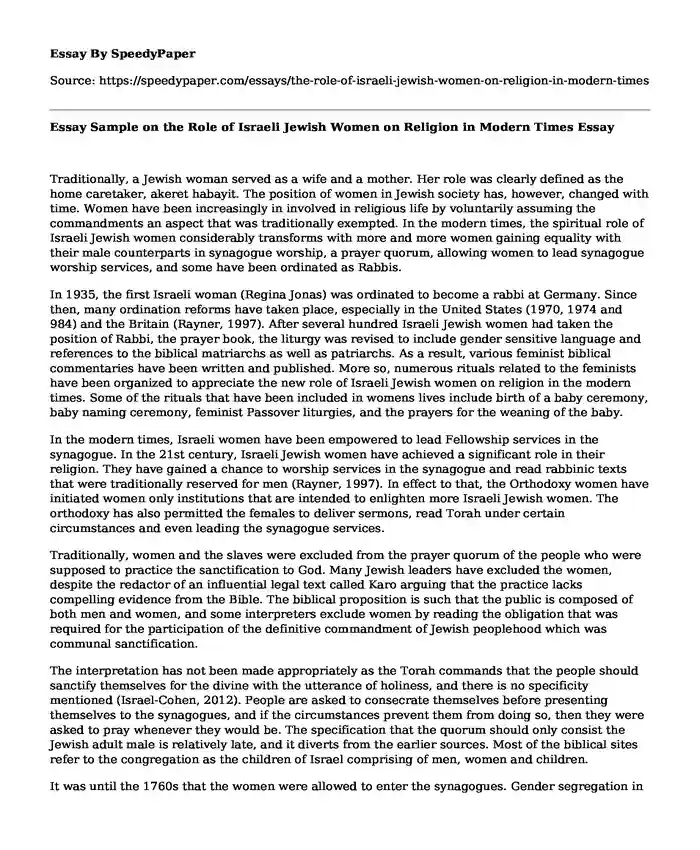Traditionally, a Jewish woman served as a wife and a mother. Her role was clearly defined as the home caretaker, akeret habayit. The position of women in Jewish society has, however, changed with time. Women have been increasingly in involved in religious life by voluntarily assuming the commandments an aspect that was traditionally exempted. In the modern times, the spiritual role of Israeli Jewish women considerably transforms with more and more women gaining equality with their male counterparts in synagogue worship, a prayer quorum, allowing women to lead synagogue worship services, and some have been ordinated as Rabbis.
In 1935, the first Israeli woman (Regina Jonas) was ordinated to become a rabbi at Germany. Since then, many ordination reforms have taken place, especially in the United States (1970, 1974 and 984) and the Britain (Rayner, 1997). After several hundred Israeli Jewish women had taken the position of Rabbi, the prayer book, the liturgy was revised to include gender sensitive language and references to the biblical matriarchs as well as patriarchs. As a result, various feminist biblical commentaries have been written and published. More so, numerous rituals related to the feminists have been organized to appreciate the new role of Israeli Jewish women on religion in the modern times. Some of the rituals that have been included in womens lives include birth of a baby ceremony, baby naming ceremony, feminist Passover liturgies, and the prayers for the weaning of the baby.
In the modern times, Israeli women have been empowered to lead Fellowship services in the synagogue. In the 21st century, Israeli Jewish women have achieved a significant role in their religion. They have gained a chance to worship services in the synagogue and read rabbinic texts that were traditionally reserved for men (Rayner, 1997). In effect to that, the Orthodoxy women have initiated women only institutions that are intended to enlighten more Israeli Jewish women. The orthodoxy has also permitted the females to deliver sermons, read Torah under certain circumstances and even leading the synagogue services.
Traditionally, women and the slaves were excluded from the prayer quorum of the people who were supposed to practice the sanctification to God. Many Jewish leaders have excluded the women, despite the redactor of an influential legal text called Karo arguing that the practice lacks compelling evidence from the Bible. The biblical proposition is such that the public is composed of both men and women, and some interpreters exclude women by reading the obligation that was required for the participation of the definitive commandment of Jewish peoplehood which was communal sanctification.
The interpretation has not been made appropriately as the Torah commands that the people should sanctify themselves for the divine with the utterance of holiness, and there is no specificity mentioned (Israel-Cohen, 2012). People are asked to consecrate themselves before presenting themselves to the synagogues, and if the circumstances prevent them from doing so, then they were asked to pray whenever they would be. The specification that the quorum should only consist the Jewish adult male is relatively late, and it diverts from the earlier sources. Most of the biblical sites refer to the congregation as the children of Israel comprising of men, women and children.
It was until the 1760s that the women were allowed to enter the synagogues. Gender segregation in the Jewish worship dated back in years to the Temple times when the women were not authorized to access it. The degree of the women segregation was too much such that they were not able to see how the services were conducted (Haberman, 2012). The synagogue became the central focus for the Jewish women to struggle for equality. In the synagogues, women were not obliged to carry out certain commandment as their observant would not be put into much consideration for the group purposes.
The women were supposed to conduct their prayers silently while standing, and they were not expected to conduct the full prayer service that a man prayed. The womans prayers could not count in the minyan which was the prayer that involved ten people who recited the prayer. If a woman participated in the prayers in that group, her prayers were not considered as well as if she was to read from the Torah (Haberman, 2012). Since the women were not obliged to perform commandments as the men were playing, they were considered as less privileged. The separation on the participation in the synagogue life does not indicate that the women are entirely excluded at the Jewish religious life since all the religion does not only happen in the synagogues.
The role of women in Judaism has been misunderstood by many interpreters and thought that the women are treated lowly as others. It can be, however, seen that most of the influential women who are there since the 20th century are the Jewish women and also the respect accorded to the Jewish women in the traditional practices, was part of their ethnic culture.
References
Haberman, B. D. (2012). Israeli Feminism Liberating Judaism: Blood and Ink. Lanham: Lexington Books.
Israel-Cohen, Y. (2012). Between feminism and Orthodox Judaism: Resistance, identity, and religious change in Israel. Leiden: Brill.
Rayner, J. D. (1997). An understanding of Judaism. Providence [u.a.: Berghahn Books.
Cite this page
Essay Sample on the Role of Israeli Jewish Women on Religion in Modern Times. (2019, Sep 09). Retrieved from https://speedypaper.com/essays/the-role-of-israeli-jewish-women-on-religion-in-modern-times
Request Removal
If you are the original author of this essay and no longer wish to have it published on the SpeedyPaper website, please click below to request its removal:
- Free Essay on the Importance of Punctuation and Grammar in Business English
- Free Essay for Students on Cultural Linguistics
- USA Tourism vs. Switzerland Tourism Essay Sample
- Making Global Connection, Free Essay in Literature
- Free Essay with Evaluation of the Quality of a Consumer Product
- Free Essay Sample on Internship Experience
- Essay Sample on Philosophy in Criminal Justice
Popular categories





